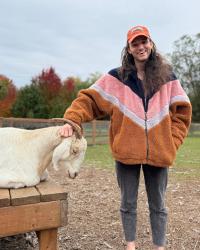
Contact Information
Biography
My research and teaching interests lay in the overlap among global environmental history, histories of disease, medicine, and public health, and Latin American and Caribbean histories. As an educator I believe in leveraging digital tools and environmental frameworks toward making early modern histories more legible to students regardless of their background or familiarity with the methods and critical perspectives of historical research. I am dedicated to helping students think historically about their own environmental contexts in relation to the past, present, and future.
My MA thesis examined English privateers as creators and circulators of scientific knowledge about the natural world between 1680 and 1720. My first research project at the PhD level took a digital historical approach to the study of the prescription records of a British colonial doctor working in Nevis in the 1880s, illuminating the global circulation of tropical medicaments and the micro politics of colonial public health in the Caribbean.
My dissertation is focused on the global history of the isthmus of Panamá in the early modern period (1500s - 1700s), and is the first in-depth study of the peculiar ecological relations and environmental circumstances that comprised the mule-driven transit industry in Spanish imperial Panamá. By providing the only means of portage between the Atlantic and Pacific oceans across the isthmus, this industry of transit--known as the trajín--was a critical feature of the early modern globalized world. From the 16th through the 18th centuries the trajín was the primary route through which people, plunder, and worldly goods moved between the Kingdoms of Castile and Peru. The dissertation demonstrates how society, economy, and ecology were co-constitutive elements of the Panamanian trajín, and emphasizes how imperial authorities on both sides of the Atlantic sought to control global flows through the management of natural and built environments, seasonal rhythms of commerce and climate, and the social and ecological relationships of a multi-cultural and multi-species labor force. I argue that the mule train industry functioned as a contrived ecology; a living engine powered by the physical work of enslaved humans and mules that drove the imperial and commercial communications of the first global maritime empire. By conceiving of the trajín in these socio-ecological terms the dissertation provides a fresh approach to global environmental history that helps re-frame the discussion of energy transitions and globalization in relation to the history of Atlantic slavery, human/non-human relations, and early modern Spanish imperialism.